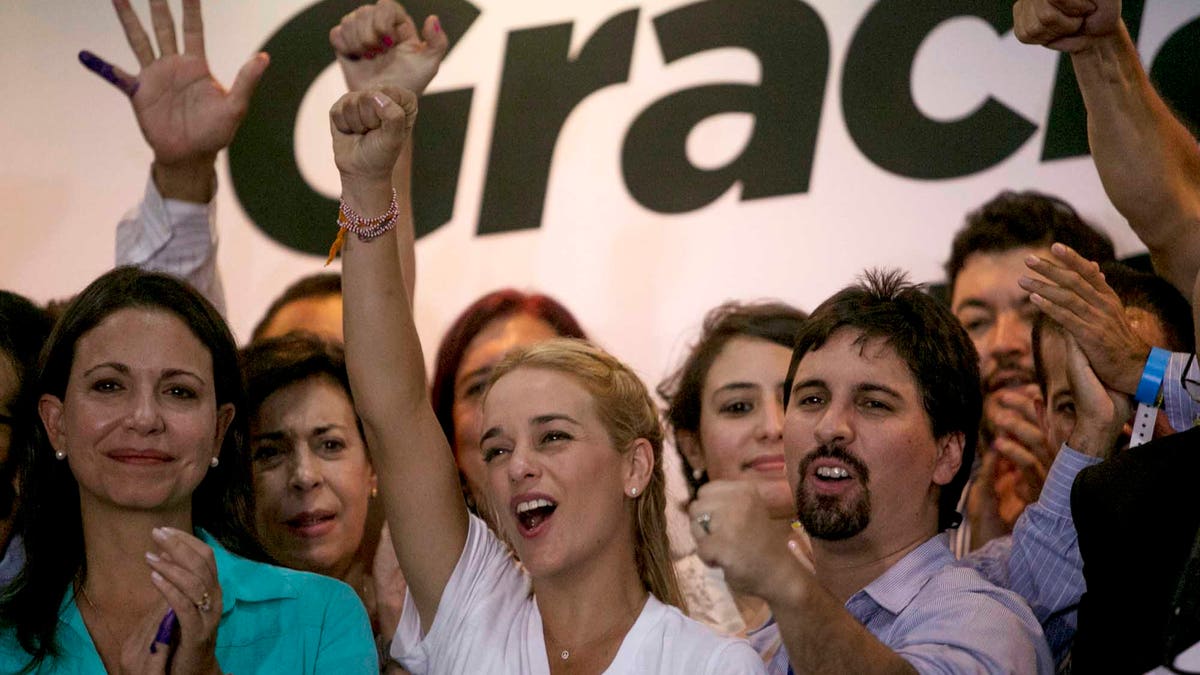
Lilian Tintori wife of jailed Venezuelan opposition leader Leopoldo Lopez, center, Freddy Guevara, of the Voluntad Popular party, right, and former opposition congresswoman Maria Corina Machado, left, celebrate in Caracas, Venezuela, early Monday, Dec. 7, 2015. Venezuela's opposition won control of the National Assembly by a landslide on Sunday, delivering a major setback to the ruling party and altering the balance of power after 17 years of socialist rule.(AP Photo/ Alejandro Cegarra) (ap)
CARACAS – Venezuela’s political leaders face new challenges after the opposition’s landslide victory on Sunday’s legislative election. The latest computations on Monday afternoon gave 112 representatives of the Democratic Unity Roundtable (MUD) 112 seats in the National Assembly, while the United Socialist Party (PSUV) got only 55.
If this is confirmed – 22 districts have not yet been confirmed by the electoral board – the two-thirds majority would allow the opposition to pass major legislation, sack Supreme Court justices or convene a convention to rewrite Hugo Chavez's 1999 constitution.
But before they get there, the 112 men and women representing 14 different political parties under the MUD umbrella face the task to come up with a plan that will effectively move the country forward once the new congress is installed on Jan. 5.
“Sunday’s victory is not a blank check for us. We have the responsibility of finding solutions to the country’s biggest problems. We can’t waste time in sterile political fights,” said opposition congressman-elect Miguel Pizarro to Fox News Latino.
Among the issues the coalition is expected to easily agree on is passing an amnesty law that would allow more than 70 political prisoners – including Leopoldo Lopez – to be released as well as taking measures to modify the Central Bank law and try to contain the spiraling inflation rate.
- Venezuela’s ruling party suffers blow in historic election, opposition retakes majority
- Opinion: After tackling Goliath rival, Venezuelan opposition must coalesce
- Venezuela’s opposition celebrates landslide win in historic election
- Venezuela’s socialist system faces electoral test as voters hit the polls
According to Reuters, the opposition is also promising new laws to stimulate the private sector and to roll back nationalizations even though it will not have the power to radically overhaul the economy from the legislature.
Analysts say some differences among the groups may start to become clear once the dust settles after unprecedented victory. For instance, while representatives from Primero Justicia (Justice First) have been more conciliatory and talked about a dialogue with the government, during the campaign trail Voluntad Popular (Will of the People) candidates were adamant about regime change as soon as next year.
Pedro Benitez, a high official with Accion Democratica (Democratic Action), conceded that the next few weeks will be charged with intense negotiations within the MUD.
“In the last five years it has been hard for the opposition to work as a single group in the National Assembly. The first internal debate will be about who is named president of the legislative branch,” Benitez explained to FNL.
Another question is whether the opposition coalition will agree to open a spot for a Chavista in the National Assembly leadership, which is made up of a president and two vice presidents.
“That’s a discussion that we will have over the next few days. I don’t want to give a personal view; we have to speak as a whole. What I can assure you today is that we will not treat our rivals like they treated us over the last five years,” Pizarro said.
When the ruling party held the supermajority (2010-2015), opposition members say, they continually blocked every initiative from the other side.
“We have to restore the Assembly as a place for dialogue,” Pizarro said.
Benitez said the government’s attitude in the following months will be key to shape the Assembly’s new dynamics.
“If they want a dialogue, we will be open to it. But voters have been clear in their demand for change and if [the government representatives] don’t want that it will only accelerate their fall,” he told FNL.
Heryck Rangel, a prominent leader of the PSUV, said Chavismo is indeed open to dialogue.
“We know how to read the results and we will coexist with the right wing majority in the Assembly,” he told FNL. “We will respect it but we will defend our points of view and our project.”
“What we fear is that part of the opposition will attack the government furiously next year. They are divided internally and some of them want to overthrow Maduro,” said Rangel, close advisor to elected representative Hector Rodriguez, from the southern state of Bolivar.
The elected PSUV members, while not many, are prominent and influential political figures in Venezuela. Rodriguez is a former cabinet member and also member of the ruling party’s National Board. Diosdado Cabello, current president of the National Assembly, won a seat, as did Cilia Flores, President Nicolas Maduro’s wife.
“We still are a strong political force,” Rangel warned.
Benitez understands this and points to unity as paramount for the opposition now that the dice have been rolled.
“If we are separate, PSUV will still be the political party with the most strength. We have to work together,” he said.
